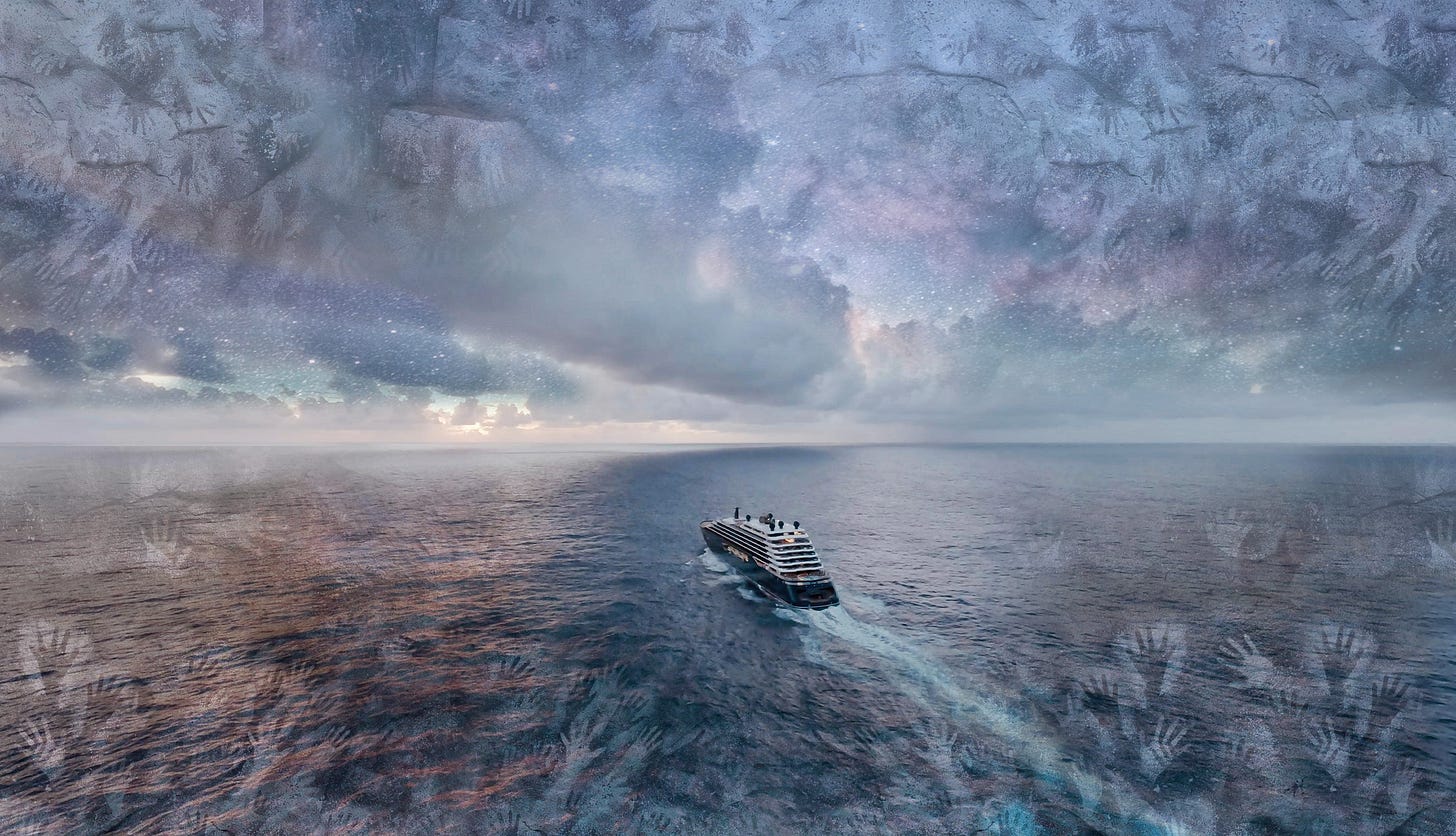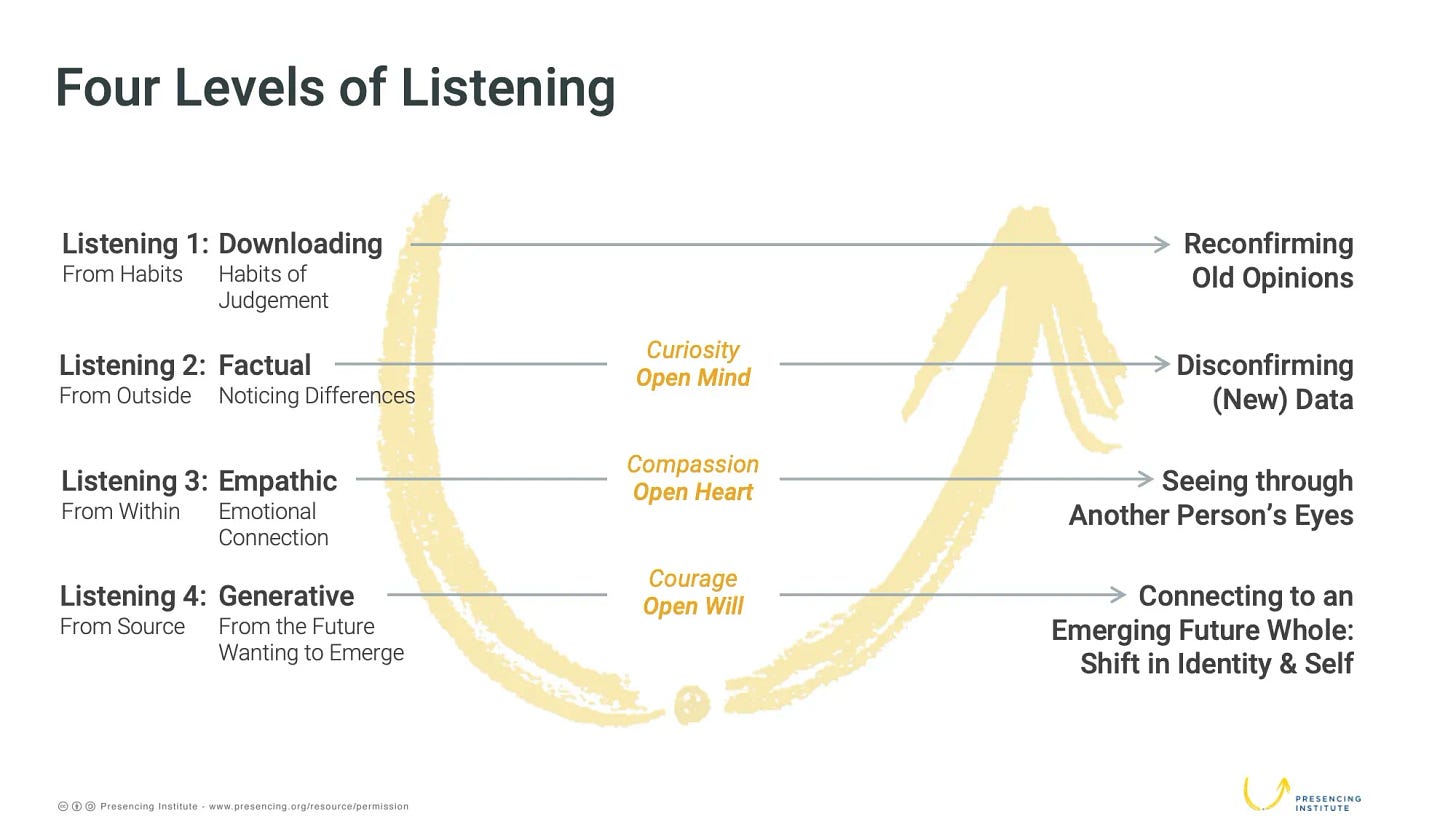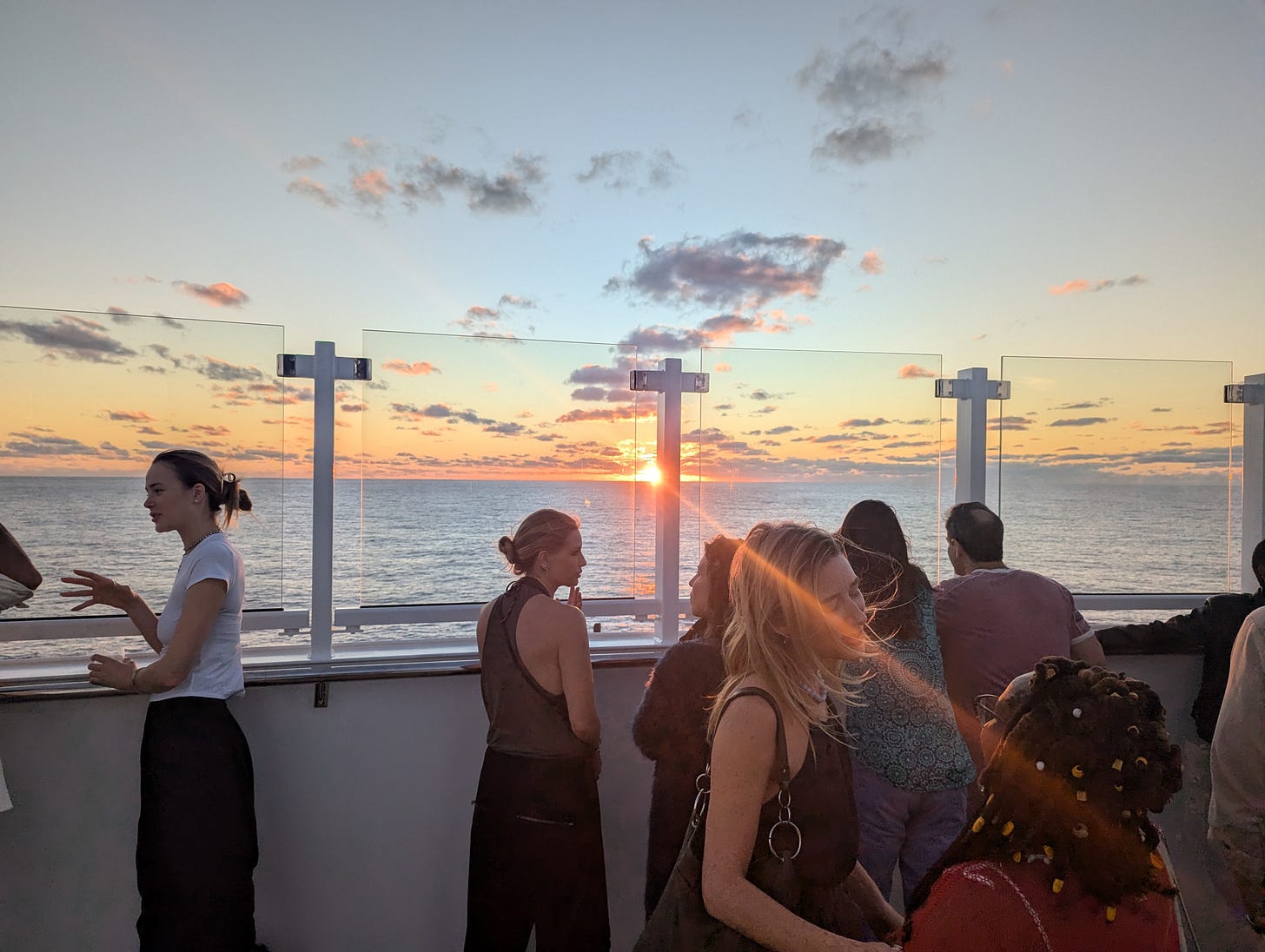So You Want to Cross the Atlantic as One Earth?
Reflections on collaboration, accountability, and the wisdom of the ocean.

On November 3, I stepped off a concrete dock in Lisbon onto the gangway of the Ilma, a brand-new 240-meter luxury yacht owned by Ritz Carlton. Over the next 10 days and nights, the Ilma carried me, 370 guests, and an equally large crew across the Atlantic to Puerto Rico at roughly the speed of a cruising e-bike. This experimental journey was organized by Earth One—a self-described “global alliance of influential, generous, and daring leaders collaborating to catalyze a new approach to social and environmental stewardship”. On board were activists, entrepreneurs, scientists, artists, investors, web3 enthusiasts, indigenous elders, and the funders who sponsored much of the trip. In short, a passionate and diverse Noah’s Ark of 21st century changemakers.
I am profoundly grateful for this experience and I’d like to share reflections on it. It’s not possible to represent the full spectrum of connections, conversations, and challenges that emerged on board. Instead, I want to focus on what worked and what didn’t, and how we build on the momentum for future gatherings. I’m hoping to provide clarity for my fellow passengers, including the Earth One team, and to share with others who weren’t on board the unique magic of this experiment. Although these are my words and my opinions, I have made an attempt to tap into broader collective feelings. In my sensemaking, I have been nourished by many conversations which will remain anonymous and for which I offer my gratitude.
Let me begin with the obvious: the tension between Earth One’s goals of social-environmental stewardship and our gathering on a cruise ship. The Ilma has 224 suites, 5 restaurants, 6 bars, two pools, a spa, and a wood panelled smoking parlor (not just cigars were smoked in there). The ship is powered by liquefied natural gas, considered a clean marine fuel by the cruise industry, but ultimately still a carbon-emitting fossil fuel. The Earth One team offset the carbon emissions of the boat, but the tone deafness of the whole endeavor remained: a luxury cruise ship is an archetypal symbol of elitism and escapism. Wealth inequality lies at the heart of the systemic imbalances in resource use that amplify biospheric collapse. In other words, eating sushi on a gilded motorboat does not sing conscious leadership.
But still, we showed up. We left our communities, our farms, our elders, our spouses, and our children for this experiment. Why? We understood the luxury cruise experience would attract powerful, wealthy, and allied individuals who might support our work. We hoped the collaborations and friendships fostered on board would justify the dissonance we felt. In today’s world, the goals of capital and social-ecological stewardship regeneration are generally at odds. Could the Atlantic Crossing be an opportunity to build real alliances between wealth holders and impactful project leaders? We made the bet that it was worth trying.
The reality of inviting a microcosm of the world into confined quarters meant that tensions surfaced very quickly. I think of Noah’s Ark and how freaking cacophonous that mythical boat must have really been, what with birds and insects, reptiles and mammals sharing the same space. Here is a short snapshot of the polarities on board - and note that these polarities are not mutually exclusive.
The technologists, with their focus on rapid innovation and scalable solutions, and the relationalists, who emphasized community-centered processes, deep listening, and the organic growth of systems rooted in place and tradition. The crypto-bros were a particular subset of technologists.
The bottom-up grassroots activists, and the top-down strategic visionaries
The capitalists interested in market-centric approaches and the post-capitalists interested in values-centric governance.
Those favorable to a Trump presidency and those horrified by it.
Citizens of the global north and citizens of the global majority.
There were many other differences I could mention - such as access to wealth, spiritual orientation, etc. The point here is that we recreated on the boat a microcosm of some of the core tensions that are rocking our world and tearing us apart. Diversity is easier to praise than to practice: were we able to practice it?
The interesting thing about a cruise ship is that there is nowhere to run away to. You inevitably end up sitting with someone who kind of just pisses the shit out of you. Even the sauna, where I would inevitably end up to close my day, was a pressure cooker of heated discussion.
One morning, I attended a deeply emotional ceremony held to address the overlap of our crossing with the crossing of Europeans to colonize the Americas. Amongst moving prayers for the future, an elder shared her anguish that the colonial ideology of wealth accumulation was still very much alive on the boat. Unless we examined these deep-rooted patterns of exploitation and entitlement, she lamented, we would perpetuate the same cycles of domination and extraction that was killing the planet.
After the ceremony, I sat down to lunch next to a stranger who shared matter-of-factly that he was on the boat for personal wealth accumulation. I tried to not let my jaw drop too much and let him speak. This man, who had attended the ceremony, felt it dwelled too much on past harms committed rather than being proactive and future-focused. He argued that capitalist markets were the most effective tools for driving innovation and tackling global crises. I realized he didn’t fully understand that the colonial past still lives on today in countless ways because he was a beneficiary of this exploitative system. He never had to look at the full picture. The experience on the boat was one of his first in-person encounters with indigenous voices. I realized the grudges and judgements I was holding towards him were preventing me from actually listening to him. With some effort, I decided to soften my gaze and chill out. We ended up opening to each other, and eventually left the table feeling understood.
On the boat, many of us felt a renewed sense of hope emerging from all the energy unleashed from conversations with those we don’t usually engage with. One elder jokingly coined the term “grandmas for crypto” to describe her discussions with the crypto-bros. It was a reminder that we all need to practice more radical love. This means accepting those who seem so different from us as real parts of the wider universal body we live in. In the therapeutic model of Internal Family Systems (IFS), the human mind is viewed as composed of multiple sub-personalities or "parts" in interaction. Giving attention to neglected parts allows for the harmonization of the self. I believe similar principles apply at larger scales. Collective healing and practical collaboration requires us to embrace these differences as opportunities rather than threats. The Earth One did an excellent job at facilitating conversations on the boat. They invited an experienced facilitator, Adam Yukelson, to introduce participants to Theory U’s four levels of listening, which range from listening to confirm existing opinions, to listening to shift one’s own identity.
Where there was a missed opportunity was in Earth One’s failure to name the polarities on board: capitalism and post-capitalism, top-down vs bottom-up, transparent vs opaque, indigenous vs tech bro. We inevitably ended up engaging with these in smaller discussions, but we didn’t engage with them as a unified whole. The result was a cognitive dissonance and a more shallow engagement with key issues. My guess is that the Earth One team was afraid of alienating specific communities, in particular the patrons on board. But a community of practice is not about being united in agreement; it’s about being united in engagement: I don’t look or think like you, but I share space with you in this world and I will walk hand in hand with you.
I believe this sense of unity on board was nourished by the living presence of the ocean around us. I didn’t realize what seeing only water around for me days on end, without any stable ground, would do to my psyche. In both mythologies and dreams, bodies of water represent the unconscious, the collective depths of our shared experiences. In the rocking of the boat, in the endless fractal patterns of waves upon waves, the ocean entranced us. Old memories resurfaced during our sleep - some haunting, others soothing. The hands of men and women thrown overboard on slave-ships shared space with the consciousness of the cetaceans whose home we sailed over.
Astronauts speak of the overview effect, a profound cognitive shift experienced when they view Earth from space, leading to feelings of awe, a sense of interconnectedness with humanity, and a recognition of the planet's fragility against the vastness of the universe. Sailors, I learned, speak of the oceanview effect, in which terrestrial life is viewed from the perspective that 71% of our planet is covered in water. Over half of the oxygen we breathe comes from phytoplankton in the ocean, which serves as our greatest buffer against climate change: about 40% of the carbon dioxide added to the atmosphere by fossil fuel burning since the beginning of the industrial era has been taken up by the ocean. The ocean, in short, reminded us of our deep interdependence.
For me, Trump’s election midway through our journey only heightened the imperative for radical collaboration. With the recent collapse of the UN COP process, we are entering a new era of geopolitical fragmentation and retreat from nation-state-driven collective global action. Whether we like it or not, top-down governance will give way to decentralized, bioregional approaches. On board, I met knowledgeable, well-travelled individuals who saw opportunity in Trumpian deregulation. And whilst I didn’t generally agree with their optimism, I was grateful to not be in an echo chamber of despair and to take a pro-active stance towards the future.
I think it’s fair to say that most of us had a very positive, if exhausting, experience. The number of professional collaborations, moments of magic, and lasting friendships that emerged on board are too many to name. But was it worth the effort?
Earth One generously sponsored over 100 innovators, activists and Indigenous leaders (“fellows”) and organized them into six thematic “guilds” (oceans, resilience, intelligences, biocultures, governance, and new economies) which met regularly on board. But the guilds, despite the best efforts of their stewards, lacked a clear, unified purpose, and there were few protocols in place to connect fellows with potential funders on board. I was in the resilience guild representing my work with NARA Climate, and I had no idea how to find a wealth holder interested in regenerative agriculture. What a missed opportunity. A “needs and offers” event and platform organized on the final day of the crossing generated real feelings of abundance and solidarity, but on a practical level was too little, too late.
The Earth One organizers skillfully took on the massive challenge of convening a incredibly diverse set of actors that would never otherwise have met. They made the courageous decision to place themselves at the crosshairs of competing polarities and ideologies. They brought chaplains on board to help navigate tensions and musicians to touch our hearts. Their work truly deserves a standing ovation, particularly for a first attempt.
But if you claim to unite funders and project leaders in service to a regenerative future - if you want to cross the Atlantic as Earth One - you must be prepared to demonstrate tangible outcomes and accountability. Serious philanthropic organizations would likely consider our crossing a wasteful joyride. It’s up to the Earth One team to demonstrate why this gathering mattered. What protocols and governance structures are in place to determine impact?
Without these, the Earth One team risks, in appearance and in practice, appropriating the cultural and spiritual capital of indigenous and activist communities for the entertainment of an elite posse. In my private conversations, many activists, indigenous folks, and women felt that they were performing emotional labor for the crossing. If we are to practice reciprocity and regenerosity, we need equitable and transparent partnerships that honor and uplift the life energy of all. Let’s hold ourselves accountable to this goal!
At this point, I notice that I’m no longer writing to my fellow passengers or to the Earth One team. I’m writing to a community of engaged humans who believe in collaboration and accountability. The Earth One team has brought us together in this first iteration, and many more will join. I bow in reverent gratitude to their efforts. Now, the ball is rolling. The Ilma has landed but our ship sails on.







As a friend to many who were on the boat, thank you for writing this. It's consistent with many of the conversations I've had since the crossing, and I appreciate the clarity and thoughtfulness you're bringing to these reflections.
Thank you for your thoughtful post and the many challenges of uniting actions and motivations for creating meaningful change that benefits all those on Earth. I swing between hopeful and resigned that things may need to get real bad before we’re willing to make serious and systematic progress. Conversation and creating community is the key and it seems that’s what the One Earth trip tried to cultivate. Maybe those connections will speed collaboration and change. Thank you.